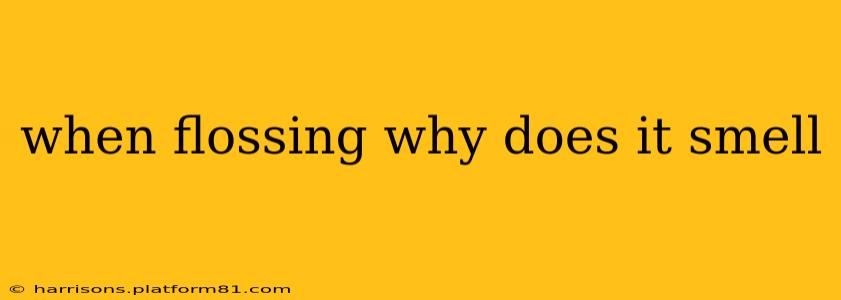Why Does My Floss Smell? Understanding the Odors of Oral Hygiene
Flossing is a crucial part of maintaining good oral hygiene, but sometimes you might encounter an unpleasant smell after flossing. This isn't necessarily a cause for immediate alarm, but understanding why it happens can help you address the issue and improve your oral health. The smell you experience often points to the presence of bacteria and food particles trapped between your teeth, where your toothbrush can't reach. Let's delve into the common causes and what you can do about it.
What Causes the Bad Smell When Flossing?
The unpleasant odor associated with flossing usually stems from bacteria breaking down food particles lodged between your teeth. This bacterial breakdown produces volatile sulfur compounds (VSCs), primarily responsible for the characteristic "bad breath" or halitosis. These compounds are largely responsible for the smell you detect when flossing.
Does it Mean I Have Gum Disease?
While a bad smell during flossing can be a symptom of gum disease (gingivitis or periodontitis), it's not always the case. Gingivitis, the early stage of gum disease, is characterized by inflammation and bleeding gums, often accompanied by a bad odor. Periodontitis, a more advanced stage, involves deeper infection and potential bone loss. However, even with healthy gums, neglecting flossing can lead to a buildup of bacteria and debris, resulting in unpleasant smells.
How Can I Prevent a Bad Smell While Flossing?
Several measures can help minimize or eliminate the bad smell associated with flossing:
-
Floss Regularly: Daily flossing is key. The more frequently you remove food particles and plaque, the less chance bacteria have to multiply and produce unpleasant odors. Aim to floss at least once a day, ideally before brushing.
-
Improve Your Flossing Technique: Ensure you're flossing correctly. Gently guide the floss between your teeth, curving it around each tooth in a "C" shape to reach below the gum line. Avoid snapping the floss against your gums, which can cause damage.
-
Use an Antimicrobial Mouthwash: Rinsing with an antimicrobial mouthwash after flossing can help further reduce bacteria and freshen your breath. Look for mouthwashes containing chlorhexidine or cetylpyridinium chloride.
-
Maintain a Healthy Diet: Reducing your intake of sugary and acidic foods can help minimize bacterial growth in your mouth.
-
Stay Hydrated: Drinking plenty of water helps rinse away food particles and bacteria, reducing the likelihood of unpleasant smells.
-
See Your Dentist Regularly: Regular dental checkups and cleanings are crucial for maintaining good oral hygiene. Your dentist can identify and address any underlying issues contributing to bad breath or gum disease.
Is it Normal to Smell Something After Flossing?
It's not uncommon to notice a smell, especially if you haven't flossed regularly. A slight smell might simply indicate the removal of trapped food particles and bacteria. However, a persistent, strong, or foul odor warrants a visit to your dentist to rule out any underlying oral health problems.
Why Does it Smell Worse Than Usual?
A significantly worse smell than usual could indicate a few things:
-
Infrequent Flossing: If you haven't flossed in a while, the buildup of bacteria and debris will be more significant, leading to a stronger smell.
-
Dietary Changes: Certain foods can contribute to bad breath.
-
Underlying Medical Condition: In rare cases, a persistent bad smell could be linked to a medical condition. Consult your doctor if you're concerned.
By understanding the causes of unpleasant smells while flossing and adopting good oral hygiene practices, you can maintain a healthy mouth and fresh breath. Remember, regular flossing is a critical component of overall oral health, and addressing any persistent bad odor is essential for preventing potential dental problems.
